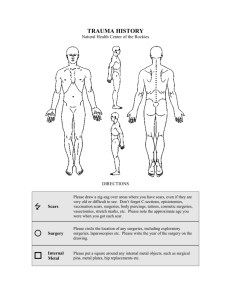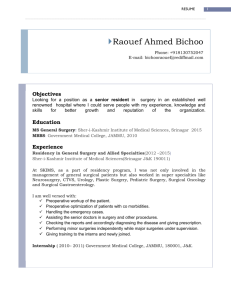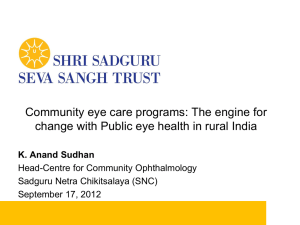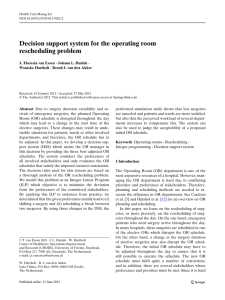Hoc-Mai Experience Viet Duc Surgical Hospital, December 2010
advertisement
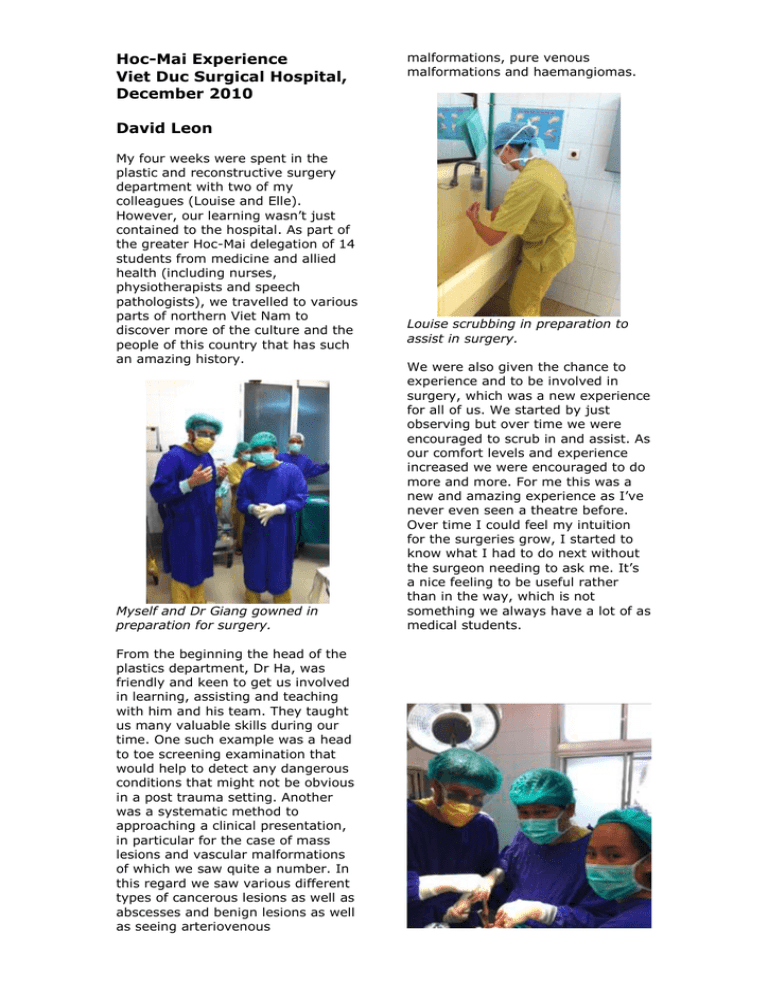
Hoc-Mai Experience Viet Duc Surgical Hospital, December 2010 malformations, pure venous malformations and haemangiomas. David Leon My four weeks were spent in the plastic and reconstructive surgery department with two of my colleagues (Louise and Elle). However, our learning wasn’t just contained to the hospital. As part of the greater Hoc-Mai delegation of 14 students from medicine and allied health (including nurses, physiotherapists and speech pathologists), we travelled to various parts of northern Viet Nam to discover more of the culture and the people of this country that has such an amazing history. Myself and Dr Giang gowned in preparation for surgery. From the beginning the head of the plastics department, Dr Ha, was friendly and keen to get us involved in learning, assisting and teaching with him and his team. They taught us many valuable skills during our time. One such example was a head to toe screening examination that would help to detect any dangerous conditions that might not be obvious in a post trauma setting. Another was a systematic method to approaching a clinical presentation, in particular for the case of mass lesions and vascular malformations of which we saw quite a number. In this regard we saw various different types of cancerous lesions as well as abscesses and benign lesions as well as seeing arteriovenous Louise scrubbing in preparation to assist in surgery. We were also given the chance to experience and to be involved in surgery, which was a new experience for all of us. We started by just observing but over time we were encouraged to scrub in and assist. As our comfort levels and experience increased we were encouraged to do more and more. For me this was a new and amazing experience as I’ve never even seen a theatre before. Over time I could feel my intuition for the surgeries grow, I started to know what I had to do next without the surgeon needing to ask me. It’s a nice feeling to be useful rather than in the way, which is not something we always have a lot of as medical students. Inserting a screw into the maxilla in order to internally fixate a fracture using a plate under the supervision of Dr Giang. We saw, and were involved in, a range of surgeries including: Multiple facial fractures Large lipoma removal Nerve graft Skin graft Venous malformation resection Rhinoplasty (both aesthetic and functional for a cleft lip) Breast augmentation Each of the different surgeries showed us something new and taught us many lessons about anatomy, surgery and pathology. The most common surgery that was performed basically everyday by our department was one or multiple facial fracture surgeries. Louise teaching anatomical English and learning anatomical Vietnamese with two of the nurses. We also had two visits from foreign surgeons. One surgeon was from Taiwan who was a specialist in hepatic transplant surgery and assisted on the microsurgery of the hepatic artery. The other was a colleague of Dr Ha’s from his days training in France who was a specialist in surgery on morbidly obese people, often with the aim of getting them ready for other necessary surgeries. It was very common for the surgeons in our department to have spent time training in France. This was quite useful as it afforded us another option for communication as Elle and myself also speak French. This apparently is disappearing somewhat in the new generation of graduates as they now have English as their dominant second language. An advanced anatomy lesson on the mandible by the Vietnamese doctors. We were also able to assist the learning process by helping with the English words and their pronunciation. The Vietnamese health system was interesting for the fact that it is a user pays system in a communist country. This lead to us experiencing the situation where treatment was in part determined by what the patient could afford. It also meant that there are 5 large boards in the emergency department with a list of the surgeries performed and the price of each. This is something that is not common in Australian hospitals. We had an amazing time learning, bonding and travelling. A huge thanks to Dr. Ha and his department for hosting us and being so welcoming and amazing teachers. Thanks also to everyone in the HocMai foundation for providing such a fantastic and irreplaceable experience.
